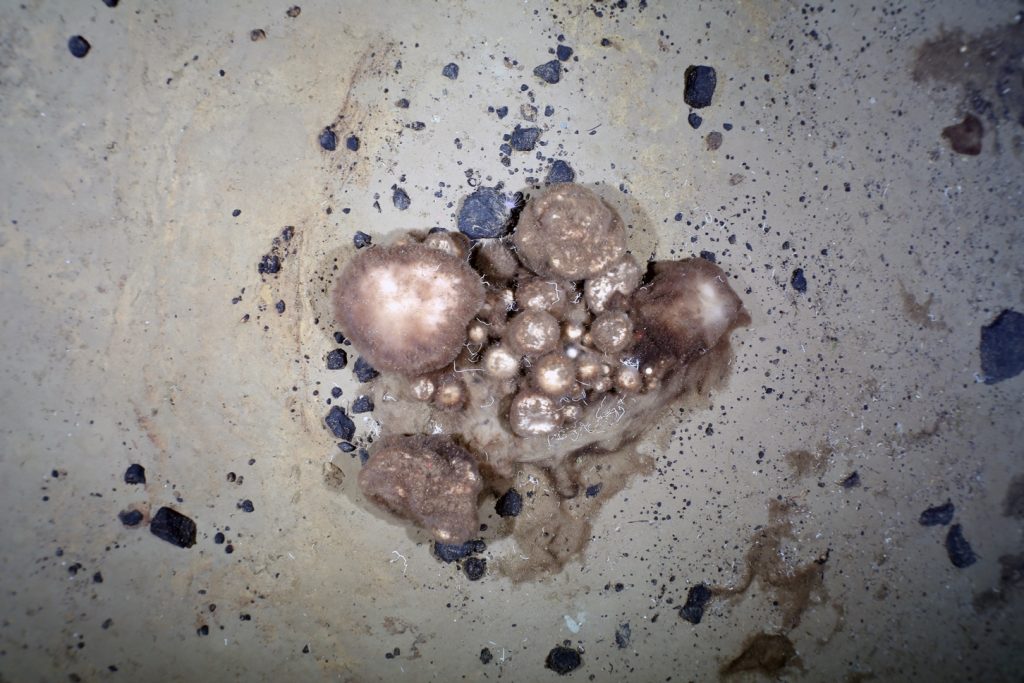NESSC - Heidelberglaan 2
About NESSC
Sponge gardens discovered in the Arctic deep sea
Researchers discovered a massive sponge garden thriving on the bottom of the Arctic Sea.
On the bottom of the Arctic Ocean, over 700 metres deep, researchers discovered a thriving garden of sponges, anemones and starfish, living on a site of extinct hydrothermal vents. The climate researchers made their surprising discovery during an expedition on the research vessel Polarstern. Almost as surprising is the way how these organism manage to stay alive in their remote habitat: by using the remnants of fauna that lived thousands years ago when the area was still volcanically active. NESSC-researcher Jack Middelburg (Utrecht University) contributed to the research that has been published in the journal Nature Communications.
Little food reaches the depths below the permanently ice-covered Arctic Ocean, because light limits the productivity of algae. However, scientists discovered a surprisingly rich and densely populated ecosystem on the peaks of extinct underwater volcanoes. These hotspots of life were dominated by sponges, growing there in large numbers and to impressive size.
“Thriving on top of extinct volcanic seamounts of the Langseth Ridge we found massive sponge gardens, but did not know what they were feeding on”, reports Antje Boetius, chief scientist of the expedition, head of the Research Group for Deep Sea Ecology and Technology at the Max Planck Institute for Marine Microbiology and director of the Alfred Wegener Institute, Helmholtz Centre for Polar and Marine Research. Using samples from the mission, first-author Teresa Morganti, sponge expert from the Max Planck Institute for Marine Microbiology in Bremen was able to identify how sponges adapt to the most nutrient-poor environment. Morganti explains: “Our analysis revealed that the sponges have microbial symbionts that are able to use old organic matter. This allows them to feed on the remnants of former, now extinct inhabitants of the seamounts, such as the tubes of worms composed of protein and chitin and other trapped detritus.”
 The dense sponge grounds discovered on the northerly Langseth Ridge seamount structure represent an astonishingly rich ecosystem, demonstrating the ability of sponges and associated microorganisms to exploit a variety of refractory food sources including fossil seep detritus. Photo: Alfred-Wegener-Institut / PS101 AWI OFOS system
The dense sponge grounds discovered on the northerly Langseth Ridge seamount structure represent an astonishingly rich ecosystem, demonstrating the ability of sponges and associated microorganisms to exploit a variety of refractory food sources including fossil seep detritus. Photo: Alfred-Wegener-Institut / PS101 AWI OFOS systemLiving on the leftovers
Sponges are considered to be one of the most basal forms of animal life. They are nevertheless successful and abundant in all oceans, from shallow tropical reefs to the arctic deep-sea. Many sponges accommodate a complex community of microorganisms in a symbiotic relationship, which contributes to the health and nutrition of the sponges by producing antibiotics, transferring nutrients and disposing of excretions. This also goes for Geodia-sponges, which dominated the community on the Arctic seamounts. The unity of sponge and associated microbes is called a sponge holobiont. Teresa Morganti cooperated with Anna De Kluijver, an expert from Utrecht University, and with the lab of Gesine Mollenhauer at the Alfred Wegener Institute to identify the food source, the growth and the age of the sponges. They learned that thousands of years ago, substances seeping from the seabed’s interior were supporting a rich ecosystem, home to a variety of animals. When they died out, their remnants remained. Now these form the base of this unexpected sponge garden.
Microbial analysis of the microorganisms supported the researchers’ hypothesis. “The microbes have just the right toolbox for this habitat”, explains Ute Hentschel from the GEOMAR Helmholtz Centre for Ocean Research in Kiel, who carried out the microbiological analyses with her team. “The microbes have the genes to digest refractory particulate and dissolved organic matter and use it as a carbon and nitrogen source, as well as a number of chemical energy sources available there.”
The scientists also showed that the sponges act as ecosystem engineers: They produce spicules that form a mat on which they crawl. This may further facilitate the local settling of particles and biogenic materials. The sponge holobionts can tap into this detrital matter, thus creating their own food trap.
Article:
Giant sponge grounds of Central Arctic seamounts are associated with extinct seep life
Nature Communications, 2022.
M. Morganti, B. M. Slaby, A. De Kluijver, K. Busch, U. Hentschel, J. J. Middelburg, H. Grotheer, G. Mollenhauer, J. Dannheim, H. T. Rapp, A. Purser & A. Boetius
doi: 10.1038/s41467-022-28129-7
Contact NESSC
| Address : | Heidelberglaan 2, 3584 CS Utrecht, Netherlands |
| Phone : | 📞 +898 |
| Postal code : | 3584 |
| Website : | http://nessc.nl/ |
| Categories : | |
| City : | Utrecht |

Write some of your reviews for the company NESSC
Your reviews will be very helpful to other customers in finding and evaluating information
Nearby places in the field of Research institute,
Nearby places NESSC

















